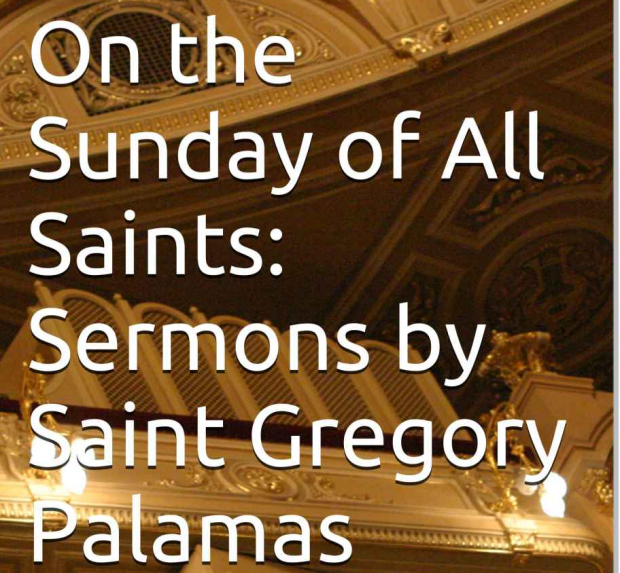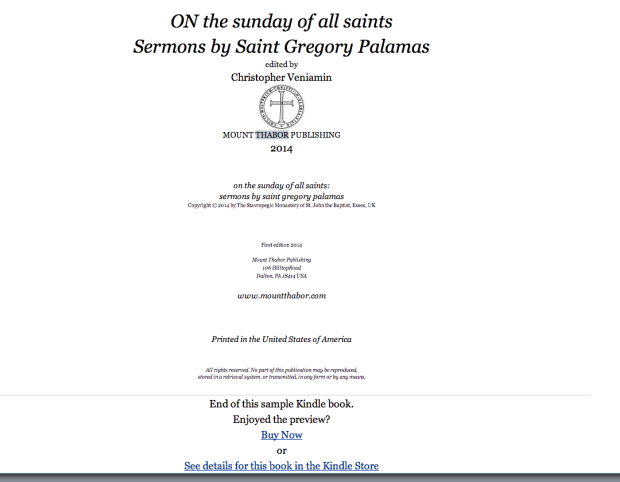The Feast of All Saints Saint in Gregory Palamas
13 Ιουνίου 2014
in
Click Here for Your FREE Kindle Reader
“Truly “God is glorious in his saints” (Ps. 68:35 Lxx). Let us call to mind the martyrs’ superhuman struggles, how in the weakness of their flesh they put to shame the evil one’s strength, disregarding pain and wounds as they struggled bodily against fire, sword, all different kinds of deadly tortures, patiently resisting while their flesh was cut, their joints dislocated and their bones crushed, and keeping the confession of faith in Christ in its integrity, complete, unharmed and unshaken. As a result there were bestowed on them the incontrovertible wisdom of the Spirit and the power to work miracles. Let us consider the patience of holy men and women, how they willingly endured long periods of fasting, vigil and various other physical hardships as though they were not in the body, battling to the end against evil passions and all sorts of sin, in the invincible inner warfare against principalities, powers and spiritual wickedness (Eph. 6:12). They wore away their outer selves and made them useless, but their inner man was renewed and deified by Him from whom they also received gifts of healing and mighty works. When we think on these matters and understand that they surpass human nature, we are filled with wonder and glorify God who gave them such grace and power. For even if their intentions were good and noble, without God’s strength they could not have gone beyond the bounds of their nature and driven away the bodiless enemy while clothed in their bodies.
“That is why, when the psalmist and prophet declared, “God is glorious in his saints”, he went on to say, “he giveth strength and power unto his people” (Ps. 68:35 Lxx). Carefully consider the force of these prophetic words. Whereas God, according to the psalmist, gives all his people strength and power – for He shows no partiality (cf. Acts 10:34) – He is glorified only in His saints. The sun pours down its rays abundantly upon all alike, but they are visible only to those with open eyes. Those with clear-sighted, pure eyes benefit from the pure light of the sun, not those whose vision is dimmed because illness, mist or something similar has afflicted their eyes. In the same way, God richly bestows His help on all, for He is the ever-flowing, enlightening and saving fount of mercy and goodness. But not everyone takes advantage of His grace and power to practise and perfect virtue or show forth miracles, only those with a good intent, who demonstrate their love and faith towards God by good works (cf. Jas. 2:20-26), who turn away completely from everything base, hold fast to God’s commandments and lift up the eyes of their understanding to Christ the Sun of righteousness (Mal. 4:2). He not only invisibly holds out a helping hand from above to those who struggle, but we also hear Him speaking to us and urging us on in today’s Gospel. “Whosoever therefore shall confess me before men”, He says, “him will I confess also before my Father which is in heaven” (Matt. 10:32).
“Notice that we cannot boldly proclaim our faith in Christ and confess Him without His strength and assistance. Nor will our Lord Jesus Christ speak out on our behalf in the age to come, recommend us to the heavenly Father and make us His kin, unless we give Him reason to do so. To make this clear, He does not say, “Whosoever shall confess me before men”, but “Whosoever shall make his confession in Me” (Matt. 10:32), that is to say, whoever is able, in Christ and with His help, to declare his faith with boldness…”





